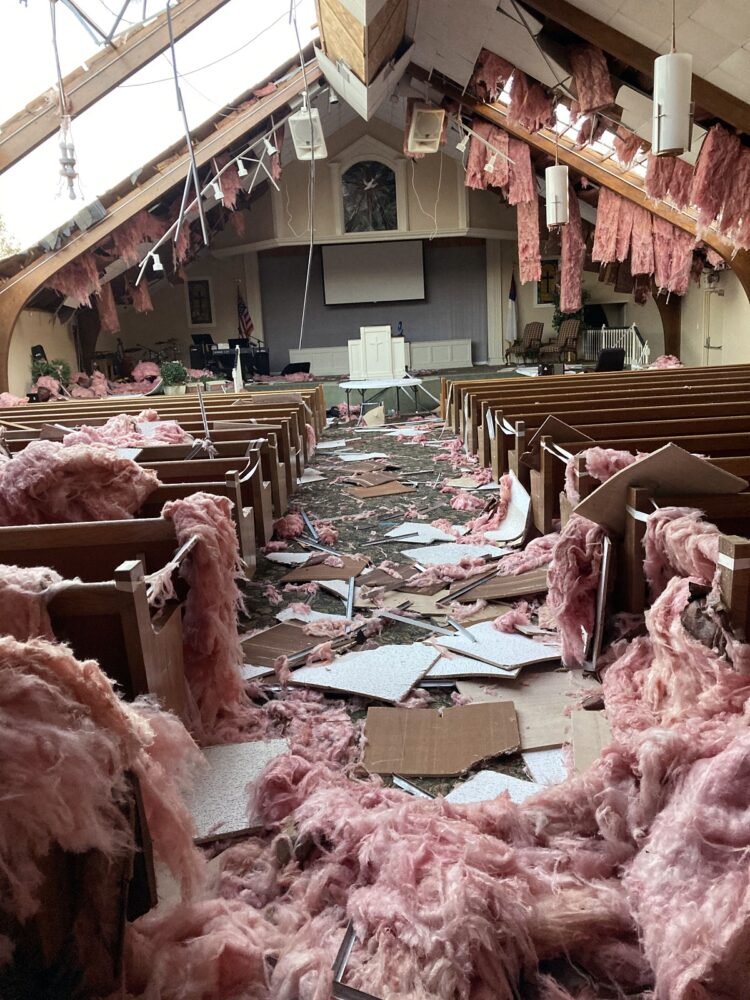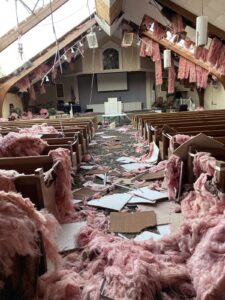Latest
The Limits of Grit
Why we forget Lake Charles
Published: November 23, 2020
Last Updated: November 23, 2020

Photo by Ricky Poole
The sanctuary of Grand Lake Faith Temple is now open to the sky, leaving ceiling and insulation debris scattered across the pews.
Editor’s Note: The 2020 Atlantic hurricane season has been the most active on record with thirty named storms at this writing, five of which made landfall in Louisiana. Tropical Storm Cristobal set the pace early in hurricane season, coming ashore near Port Sulphur on June 7. Then came Marco, another tropical storm, on August 24. Hurricane Laura, a category 4 storm, arrived three days later, wreaking utter havoc on southwest Louisiana and continuing on a path of destruction that stretched from the Gulf Coast to Tennessee.
By October the National Hurricane Center had run through their annual list of storm names and shifted to the Greek alphabet. On October 9 Hurricane Delta, traveling on a path strikingly similar to Laura, tore through communities like Lake Charles that had barely begun to recover from the last storm. Southeast Louisiana, too, including the metro New Orleans area, had its own hurricane woes with Hurricane Zeta arriving on October 28. At the time of landfall, New Orleans was still sheltering thousands of residents from Calcasieu and other southwestern parishes displaced by Laura and Delta.
November 9, 2020. I come from a family of roofers. When hurricanes push against the coast of southwest Louisiana, and everyone evacuates, we go to work. We patch, felt, cover the holes to protect what people have spent their lives building. We dig in for the long haul, knowing that temporary patches require permanent, more taxing repairs. Here in Lake Charles, we’re built on generations of grit. Everyone works until the job is done. Or, we used to work that way. Grit just doesn’t survive in times like these.
Psychologist Angela Duckworth defines grit as what it takes to keep going after failure. More than perseverance, grit has to do with passion, with loving something enough to continue investing when the odds are no longer in your favor. Historically, down in the marshlands, grit has outlasted hurricanes every time.
We shoveled mud and tore soggy insulation out of homes after Hurricane Rita in 2005. Three years later, we watched the wave of sea gulls fly across the fields again, a sign that the Gulf waters were returning after Hurricane Ike. Muscle memory took over then too: shovel, tear, fix.
As Hurricane Laura formed in the Gulf of Mexico in late August, we rolled our eyes at a minor annoyance. As the storm strengthened, we grew resolute, bracing ourselves for that familiar work to come. We were just beginning to rebuild, to find our grit, when Hurricane Delta erased our efforts.
The scene is unlike those we witnessed before: no structure is left untouched. Entire roofs lie on the other side of the road. Trailer homes rest on their backs several fields over. Cars sit wedged beneath the trunks of trees hundreds of years old, yet uprooted. The trees that are left standing no longer hold leaves or limbs.
If I’m being honest, I have come late to this aftermath. I may have grown up in southwest Louisiana, but years ago I took my grit and left. As the running joke goes, “All the smart ones do.” When news of Hurricane Laura hit, I called my father, the roofer, to get the real story—the scene is never usually as severe as the news depicts. “I won’t make it through this storm,” he said, a man who once carried bales of hay through waist deep water so that lost cows had something to eat. We hung up, and I drove all night to get to Lake Charles.
I only had ten days to give, and I hoped it would be enough to clear the debris, buoy their resolve. Instead, I watched how grit runs out. I saw it in my uncle’s eyes as the rain kept seeping into homes and there weren’t enough nails, let alone hands, to bind tarps to plywood to cover all the holes. I saw it in the family that pitched a tent, once used for camping, next to the heap of lumber and shingles that was their home. I saw it in the thick, black mold growing too quick and ruining the walls that at first seemed salvageable. National news may tell of initial damage, but few stick around to see the decay.
Ten days later, I was among those who promised “relief” and then left before the job was done. Up north, I’m surrounded by those not awestruck to witness every house in their neighborhood standing sturdy, by those who feel no guilt with clean water and electricity. Most folks up here have not heard about what happened to Lake Charles.
I have tried to explain, but words like “displaced,” even “homeless,” don’t adequately capture it. It’s that the entire city went from security to shambles in a day. It’s that Cajun grittiness compels us to help one another, but when everyone has lost everything, there’s no help to go around. It’s that bodies, wrecked by virus and heat exhaustion, are breaking down just as they are needed for their strength, their stamina. It’s that home no longer is.
I wish I could have given Lake Charles ten more days, ten more months. But one extra hand, I know, will not do it. Weeks later, people continue to need warm meals, places to sleep, and roofs. They cannot rebuild if their basic needs are not being met.
Those of us not there forget about the people of Lake Charles precisely because they are strong, gritty, resolute. Most of the time, no one there needs, much less wants, our help. Sometimes, though, people can only survive if a helping hand is extended, if hope for that place can reach beyond the bounds of the parish and the state, if grit can reenter through the persistence of those who refuse to forget.
Megan Poole is a Lake Charles native and an assistant professor of English at the University of Louisville.
